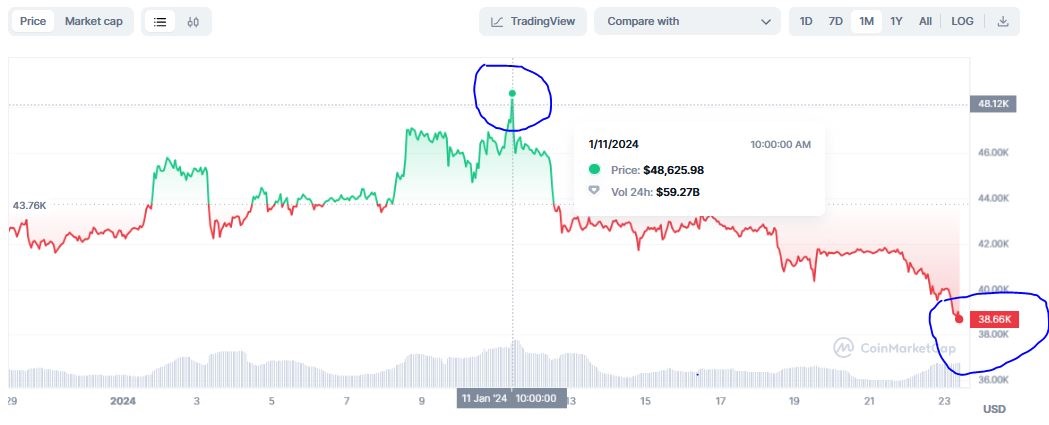Should DIY Investors Buy Bitcoin ETFs?
 The Bitcoin ETFs have gotten a lot of media attention recently.
The Bitcoin ETFs have gotten a lot of media attention recently.
After years of contemplation, the SEC finally approved several “spot” Bitcoin ETFs (exchange-traded funds) for trading on stock exchanges.
They include the following:
| Data verified as of 01/16/2024 | |||||
|---|---|---|---|---|---|
| Bitcoin ETF Name | Symbol | Initial Ex. Ratio | Ex. Ratio (after waiver) | Waiver Date | SEC Link |
| ARK 21Shares Bitcoin ETF | ARKB | 0.00% | 0.21% | 07/11/2024 | Filing |
| iShares Bitcoin Trust | IBIT | 0.12% | 0.25% | 01/11/2025 | Filing |
| Fidelity Wise Origin Bitcoin Fund | FBTC | 0.00% | 0.25% | 07/31/2024 | Filing |
| Bitwise Bitcoin ETF | BITB | 0.00% | 0.20% | 07/11/2024 | Filing |
| Invesco Galaxy Bitcoin ETF | BTCO | 0.00% | 0.39% | 07/11/2024 | Filing |
| Valkyrie Bitcoin Fund | BRRR | 0.00% | 0.25% | 04/11/2024 | Filing |
| WisdomTree | BTCW | 0.00% | 0.30% | 07/11/2024 | Filing |
| VanEck Bitcoin Trust | HODL | 0.25% | 0.25% | None | Filing |
| Franklin Bitcoin ETF | EZBC | 0.00% | 0.19% | 08/02/2024 | Filing |
| Grayscale Bitcoin Trust | GBTC | 2.00% | 2.00% | None | Filing |
| Hashdex Bitcoin | DEFI | 0.94% | 0.94% | None | Filing |
| Sources: Fidelity, SEC Filings |
Here’s a more detailed look at Bitcoin ETF fees.
ETFs make it as easy as stocks to own and trade assets like index funds, bonds, commodities, and now digital assets.
The Bitcoin ETFs simplify investors’ options to gain investment exposure to Bitcoin, avoiding cold storage or special brokers like Coinbase.
But now that owning Bitcoin is easier than ever, should DIY investors buy Bitcoin ETFs?
Full Disclosure: I have no plans to buy Bitcoin ETFs.
Table of Contents
Speculation
Most investors can comfortably allocate up to five percent of their investment portfolios to speculative investments.
These can include alternative assets, long or short stock options, venture capital investments, or starting a business.
So, I have no problem with speculation and encourage it where you may have an advantage or insight.
If you think Bitcoin will rise and want to speculate on that, go for it.
I first heard about Bitcoin when it was worth less than $10. People who speculated between then and $40,000 did well. Hindsight is 20/20.
We’ve had plenty of opportunities to buy Bitcoin. Several online brokers, including Robinhood, M1 Finance, and Webull, now offer crypto assets, so we no longer need special brokers.
ETFs expand access to almost everyone (except Vanguard customers).
New opportunities to own Bitcoin shouldn’t be a reason to invest. So, before you consider speculating to buy Bitcoin ETFs, understand the driving factors behind its price.
No Intrinsic Value
Stocks, real estate, precious metals, and most assets have intrinsic value.
Intrinsic value is a measure of what an asset is worth.
Financial analysts and investors can estimate an asset’s fair value using quantitative (data-driven) and qualitative (subjective judgment) financial modeling.
For example, when you buy a company’s stock, you purchase the present value of expected future earnings and potential capital growth.
Real estate investments have highly measurable intrinsic value. Even gold has intrinsic value because of its industrial and ornamental uses.
Cryptocurrencies do not have intrinsic value. Therefore, no analyst can evaluate Bitcoin and calculate a fair price.
Like cryptocurrencies, the U.S. dollar (a fiat currency) doesn’t have intrinsic value. Still, it has the backing of the U.S. government, its tax authority, and the ability to adjust the money supply (a practice digital currency supporters criticize).
Nearly everyone accepts the U.S. dollar in exchange for goods and services. There is already mass adoption and a few centuries of trust in the currency. But we don’t invest in the dollar; we use it for economic participation.
Though, that doesn’t mean it can’t fail someday.
A tiny fraction of the world’s population accepts Bitcoin and other digital currencies as payment for goods and services, or as a value storage.
Since Bitcoin has no intrinsic value, high volatility, and minimal utility, its price fluctuations rely entirely on supply and demand.
Supply is severely constrained, thereby leaving demand as the primary price driver.
Demand (and Supply)
By design, Bitcoin will only ever have 21 million coins in existence. Unless you’re a Bitcoin miner, you can only buy existing Bitcoins (through the ETFs or directly).
As I write this, there are:
- Total Bitcoins in existence: 19,606,275
- Bitcoins Left to be mined: 1,393,725
- % of Bitcoins issued: 93.363%
- New Bitcoins per day: 900
- Mined Bitcoin blocks: 827,004
The data changes every 10 minutes. Here’s the latest.
The current estimate for when Bitcoins will be fully mined is in 2140, but 93.363% of coins are already mined.
Bitcoin is often compared to gold as a store of value. But when gold prices rise, gold miners can invest more to mine more gold. The increase in supply will eventually lower the price. Too much fresh supply and prices fall.
Bitcoin’s supply growth is linear, then finite, and will not increase or decrease in response to prices.
Since new supply cannot adjust to market prices, Bitcoin is always at risk of being more volatile than physical assets.
Further constraining supply, analysts estimate up to 30% (6 million) of all Bitcoins “in circulation” are gone permanently due to lost passwords and hardware devices. Bitcoin’s pseudonymous and dormant creator, Satoshi Nakamoto, owns another 1.1 million.
And Bitcoin enthusiasts and cheerleaders can simply hold (“hodl”) to reduce circulation. These are the same people who go on TV and say Bitcoin is going higher, like the Pied Piper with his flute.
If holders convince new investors to buy while simultaneously restricting supply (by holding their Bitcoins), the price will rise.
The newest bull case for Bitcoin now that the SEC approved ETFs is that registered investment advisors (RIAs) can now comfortably buy Bitcoin for clients. RIA-managed assets are estimated to be a $30 trillion market.
More buyers and constrained supply means Bitcoin’s price could increase.
The Bear Case
Writing that last section, I felt like a Bitcoin cheerleader. There are significant reasons for Bitcoin to rise.
The bear case for Bitcoin is strong, too.
Anticipation of the Bitcoin ETFs’ approvals caused a surge in Bitcoin’s price. The price peaked the morning the ETFs started trading.
But just 12 days later, Bitcoin lost $10,000 in value! That’s a 20% drop.

ETF demand was not pent up. Curious investors will watch as Bitcoin attempts to find a bottom now that the SEC acquiesced and cheerleaders got what they wanted.
Bitcoin isn’t much and doesn’t do much. It was created out of thin air.
Somebody made it up and convinced investors to care. It was cool and revolutionary at first.
But it has proved to be a lousy transactional currency.
More impressive, it spawned a new technology (blockchain) and entire industries and marketplaces (thousands of cryptocurrencies, NFTs, decentralized finance, etc.).
Though tech thought leaders believed crypto was the next big thing and every other startup claimed to use blockchain, tokenization, smart contracts, and cryptology, interest in Bitcoin has fizzled.
In 2022, Bitcoin’s value more than halved, $100,000 jpegs became worthless, and A.I. large-language models became the next shiny object.
Startups and Fortune 500 companies now brag about A.I. instead of blockchain.
Bitcoin has Ponzi-like attributes. Namely, new investors fuel profits for old investors.
Though Bitcoin transactions are transparent, coin owners are usually anonymous. Bitcoin enables digital blackmail, drug deals, and dark-web activities.
Large Bitcoin owners who hold coins could change their minds and sell assets, causing price declines. When out of favor, Bitcoin could fall dramatically.
It could fall to zero.
But like some cheerleaders propose, it could reach $1 million someday. If it does, most of us will watch in awe and probably regret not joining in today.
Conclusion
Bitcoin is now available to all investors with a brokerage account. It’s as easy to buy as stocks.
Crypto-cheerleaders rejoice that the asset they already “hodl” can now be bought by investment advisors and any retail sucker, potentially rivaling the use of commodity ETFs like GLD and SLV.
But simplified widespread access doesn’t change what Bitcoin is — a digital asset with no intrinsic value and limited usefulness. It’s volatile, criminal-friendly, and at risk of global regulation.
Several undesirable attributes make it a highly speculative asset, which, if you’re looking to speculate on something ultra-risky for excellent returns, might be worth considering.
Cryptocurrencies will have their place in the future. Stablecoins like USDC, blockchain, smart contracts, tokenization, and DeFi have viable use cases if they can build trust.
Unfortunately for crypto enthusiasts, anonymous bad actors have hacked and robbed the industry into widespread distrust. Regulation will eventually catch up.
Bitcoin’s value has soared over the past decade. And where it goes from here, nobody knows.
But that won’t stop the cheerleaders, who happen to hold substantial quantities of Bitcoin, from making outlandish predictions to try and convince the masses to accept Bitcoin as forever legitimate.
The Pied Pipers of the cryptocurrency world stand to become very wealthy if they can just convince a small number of the 8 billion global citizens to join them.
The Bitcoin ETFs are the latest flutes.
Featured photo via DepositPhotos used under license.

Craig is a former IT professional who left his 19-year career to be a full-time finance writer. A DIY investor since 1995, he started Retire Before Dad in 2013 as a creative outlet to share his investment portfolios. Craig studied Finance at Michigan State University and lives in Northern Virginia with his wife and three children. Read more.
Favorite tools and investment services right now:
Sure Dividend — A reliable stock newsletter for DIY retirement investors. (review)
Fundrise — Simple real estate and venture capital investing for as little as $10. (review)
NewRetirement — Spreadsheets are insufficient. Get serious about planning for retirement. (review)
M1 Finance — A top online broker for long-term investors and dividend reinvestment. (review)

Another great article! Bitcoin is just legalized gambling. You might as well go to Las Vegas and bet on the roulette wheel. I’ve seen some employers say they will allow their employees to invest half their salary in Bitcoin. I’ve responded to these uninitiated fools that Bitcoin is not an investment but a gamble. Thanks for explaining Bitcoin so thoroughly.
I don’t think the roulette wheel is the right analogy. Bitcoin is up over the years. People are adopting it, and it’s not an all or nothing gamble.
The salary thing it definitely stupid.